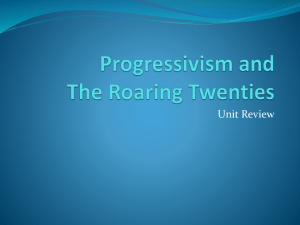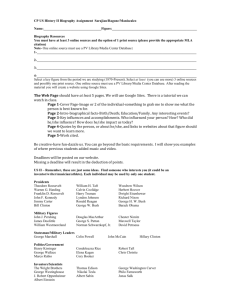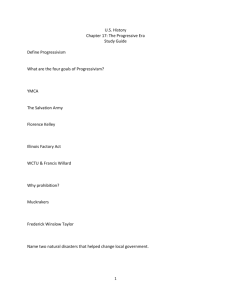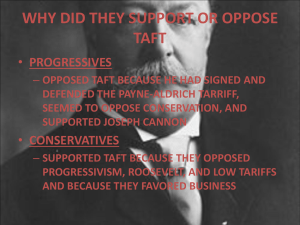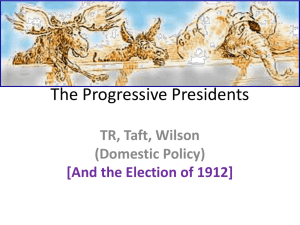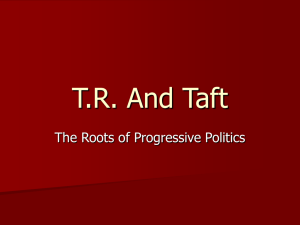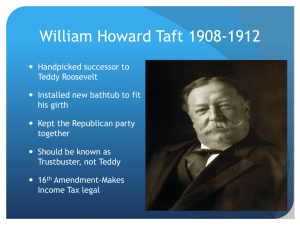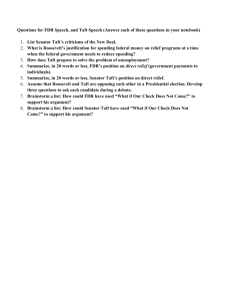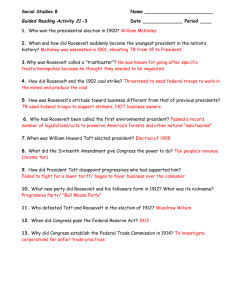Taft
advertisement
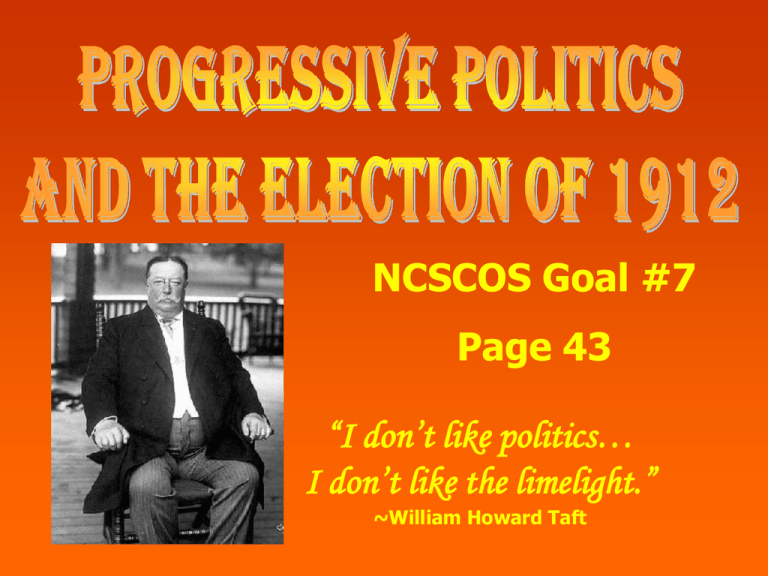
NCSCOS Goal #7 Page 43 “I don’t like politics… I don’t like the limelight.” ~William Howard Taft 1908 Election Democratic Candidate William Jennings Bryan vs. Republican Candidate William Howard Taft After winning the election in 1904, Roosevelt pledged not to run for reelection in 1908. He handpicked his secretary of war, William Howard Taft to run against William Jennings Bryan, who had been nominated by the Democrats for the third time. Under the slogan, “Vote for Taft this time, you can vote for Bryan any time,” Taft and the Republicans won an easy victory. Taft Elected -Roosevelt serves two terms • Will not seek a third -William Howard Taft designated to replace him • Secretary of War under Roosevelt (hand-picked) -Taft never wanted or liked being President -reluctant to use Presidency as bully pulpit • Does not want to expand Roosevelt’s reforms, just consolidate reforms Taft pursued a cautiously progressive agenda, seeking to consolidate rather than expand Roosevelt’s reforms. Taft confessed that he never felt like the president. “When I am addressed as ‘Mr. President,’ I turn to see whether you are not at my elbow.” Taft hesitated to use the bully pulpit, nor could he subdue troublesome members of his own political party. Activities -Roosevelt earned name as trustbuster -Taft breaks up twice as many trusts in half the time • 90 trusts split up in 4 years • Not recognized for work -tried to lower tariffs • Failed when Senate offered a countering bill to raise tariff Roosevelt realized that lowering tariffs would risk severe tensions, pitting producers (manufacturers and farmers) against consumers. Taft ignored the risks and tackled the tariff boldly, on the one hand encouraging reformers to fight for lower rates, then cutting deals with conservative leaders that kept overall rates high. The resulting PayneAldrich tariff of 1909 was too high for most reformers, but Taft took credit, calling it the best bill to come from the Republicans. He alienated all sides. • Payne-Aldrich increased tariff and angered Progressives -angered the conservation movement by opening up gov’t lands - 1 million acres taken out of government reserve -Fires Pinchot (Leader of the US Forest Service) • Less conservation angers Progressives Taft angered conservationists by appointing as his Secretary of the Interior Richard A. Ballinger, a wealthy lawyer from Seattle. Ballinger, who disapproved of conservationist controls on western lands, removed 1 million acres of forest and mining lands from the reserved list and returned it to the public domain. When a Department of the Interior official was fired for protesting Ballinger’s actions, the fired worker published a muckraking article against Ballinger. President Taft sided with Ballinger, and he fired other protestors from the U.S. Forest Service. Taft’s Struggles -progressive and conservative parts of party begin to fight -Speaker Joe Cannon old style conservative goals clashed with progressives • Conservatives do not want change, Progressives do • Ignores Progressive bills -Republicans argue over party goals and leaders • Remove Cannon from power in the House of Reps. As President, Taft supported House Speaker and former political boss “Uncle Joe” Cannon, who often disregarded seniority in filling committee slots and weakening progressive bills. This led to discontent within the Republican party and eventually hurt President Taft. Taft’s Struggles -Republicans lose control of H.O.R. - split in Republican party loses voters’ support -TR decides to try for third term • New Nationalism campaign -Taft and Roosevelt vie for 1912 party nomination • Both want Republican nomination for President Once Roosevelt returned from safari in Africa, he wanted to run for a third term as President. Therefore, Roosevelt and Taft were fighting to gain the nomination from the Republican Party, which can only nominate one candidate for President. Bull Moose Party -Roosevelt decides to run for 3rd term • Republicans want Roosevelt, but Taft controls convention and wins nomination -Roosevelt forms his own Progressive Party • Nominate Roosevelt for President in 1912 election Bull Moose Party Many Republicans liked Roosevelt, but since Taft was the incumbent and had control of the Republican National Convention, Taft won the Republican nomination. Roosevelt’s supporters then formed their own Party, the Progressive Party, and nominated him for President in the 1912 election. -New Nationalism federal powers should be expanded to protect the public -supported many Progressive reforms • Voting and workers’ rights Roosevelt’s Progressive Party was often called the “Bull Moose” party. Supporters started this nickname after Roosevelt was shot in the shoulder during one of his speeches, yet continued his speech until he finished. One onlooker said, “Look at Roosevelt, standing there like a bull moose!” The Bull Moose Party influenced the election of 1912 by taking votes away from the countering Republicans, and leaving more percentage of votes for Democrats. How do you think this affected the overall election? New Freedom -Democrats nominated reform governor Woodrow Wilson -New Freedom -Fight For Privileges • The Triple Wall of Privilege: trusts, tariffs, and high finance • Want to make America more affordable for citizens wealth, anti-trust, banking reform, lower tariffs favored small business interests over monopolies which were evil “If the government is to tell big businessmen how to run their business, then don’t you see that big business men have to get loser to the government than they are now? Don’t you see that you must capture the government, in order not to be restrained too much by it?...I don’t’ care how benevolent the master is going to be, I will not live under a master. That is not what America was created for. America was created in order that every man should have the same chance as every other man to exercise mastery over his own fortunes.” ~Woodrow Wilson, in The New Freedom Election of 1912 Republican vote/Bull Moose vote = Democratic Victory in 1912 -voters had choice between conservatism, New Nationalism, New Freedom, or Socialism • Taft, Roosevelt, Debs, Wilson -Socialist Debs got nearly 1 million votes • Took votes from other candidates -Roosevelt and Taft split the Republican voting -Wilson wins the election with only 42% - popular vote • Democrat Woodrow Wilson becomes President in 1912 “Don’t interfere when your enemy is destroying himself.” ~Woodrow Wilson With four candidates running in the election of 1912, Democrat Woodrow Wilson only gained 42% of the popular vote. However, he won an overwhelming 82% of the electoral vote, winning him the election. Wilson Becomes President William Howard Taft never wanted to be President. After serving one term, Taft left the White House, which he called “the lonesomest place in the world,” and taught constitutional law at Yale for 8 years. In 1921, President Harding named Taft chief justice of the Supreme Court. The man whose family had nicknamed him “Big Lub” called this appointment the highest honor he had ever received. As chief justice, Taft wrote that “in my present life I don’t remember that I ever was President.” However, Americans remember Taft for many things, especially the Presidential custom of throwing out the first ball of the major league baseball season.
